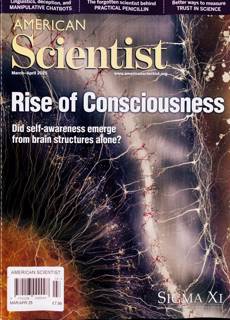Basket. 1.00

Pioneering Print Since 1898
American Scientist Magazine
Within the pages of this leading science magazine may be found the latest scientific news, coverage of experiments, discoveries and controversies, and detailed explanations and examinations of world-leading research. Aimed at those with more than a passing interest in science, American Scientist covers every scientific field from Astrophysics and Particle science to biology and engineering, bringing you the very fundamentals of the universe alongside more topical and relevant science. Written by leading scientists, this magazine is an absolute fountain of knowledge and information.
Buy a single copy of AMERICAN SCIENTIST or a subscription of your desired length, delivered worldwide. Current issues sent same day up to 3pm! All magazines sent by 1st Class Mail UK & by Airmail worldwide (bar UK over 750g which may go 2nd Class).
‘Science as a spectator sport’. So ran an editorial in the New Scientist last September when the story that neutrinos, tiny subatomic particles, had been found potentially travelling faster than the speed of light at an experiment conducted at CERN and Gran Sasso. The results have since had much doubt cast upon them by the scientific community, something reaffirmed by apparent errors found by the researchers that have suggested faulty results.
But that’s not important. It really doesn’t matter whether there particles actually broke the speed of light (though a fair few physicists might disagree with us on that point), what is more important was the reaction, both in the press and society.
This was a story of incredibly abstract science – something that if true might affect the fundamental understanding of the universe but really won’t affect how you behave when you pop down the shops for a pint of milk. Somehow, this story managed to capture the public’s imagination despite being almost entirely irrelevant to everyday life. This shows how there is a desire to know more about science, to see how scientists probe and examine the most basic of our assumptions about the universe we inhabit. Science might never be the same again, not because it has changed itself, but because the understanding of what it means and how it works has been improved. NB
You may also like ...
- Copyright © 2025 Newsstand
- Terms & Conditions
- Privacy Policy











